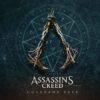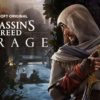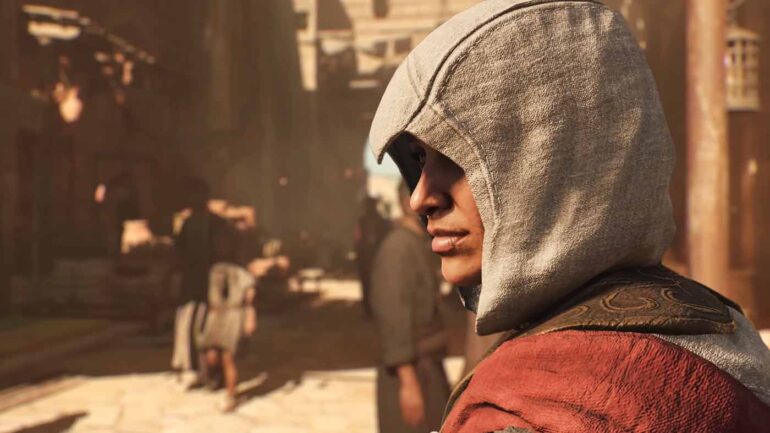Sitting across from Assassin’s Creed Mirage’s Narrative Director Sarah Beaulieu as she animatedly explains the delicate details of video game story writing, you’d never guess she just got off a 20+ hour flight from France. Having been in transit for about as long as Mirage’s main campaign will run players when the game launches later this week, it’s hard to see anything other than excitement on Beaulieu’s face in the Ubisoft Sydney office. But a game like Mirage, even with its veritable army of developers, doesn’t come easy and while the atmospheric fan events and the general goodwill around the game has bolstered the spirits of the Ubisoft Bordeaux team, Beaulieu is still processing what she calls the “overwhelming” experience of working on a franchise as storied, monitored, and adored, as Assassin’s Creed.
We’re in launch week! How are you feeling? How’s the team feeling?
It’s a mix of feelings! It’s both excitement and fear and joy and, you know, it’s a melting pot.
But I think everybody is excited. It’s very…yeah (laughs).
I noted in my preview that Basim reminded me of the early days of Assassin’s Creed protagonists, like Ezio, but how was it writing for a character with a fixed end point? How do you craft a coming-of-age story when we all know this character already?
Well, I like to say it was pretty easy. It was not easy, but it was not that complicated. As you know from playing Valhalla – yes, Basim has a specific fate, and we know where he comes from, but it was basically a blank page before Valhalla. So, the only thing we knew is he grew up in Samarra, he lost his father, and that’s all we had. As you know, Assassin’s Creed lore is very complex, and we made sure that we wouldn’t do (sic) any mistakes with the character. So, I talked with Darby McDevitt, the Narrative Director of Valhalla, making sure that I wouldn’t do any mistakes.
But otherwise, I like to say it’s a totally different character. And you played the game, so you know that he doesn’t speak the same way, he doesn’t have the same personality at all. So actually, it was pretty exciting just imagining how everything happened and how he became the character he is in Valhalla. And I know that a lot of people actually hate him, so that was… that’s fair, I mean, I understand that. But what I liked in him in Valhalla was the fact that he had this mystery around him. He’s not very talkative. And I like the challenge of making people who hate Basim currently love him when they play Mirage.
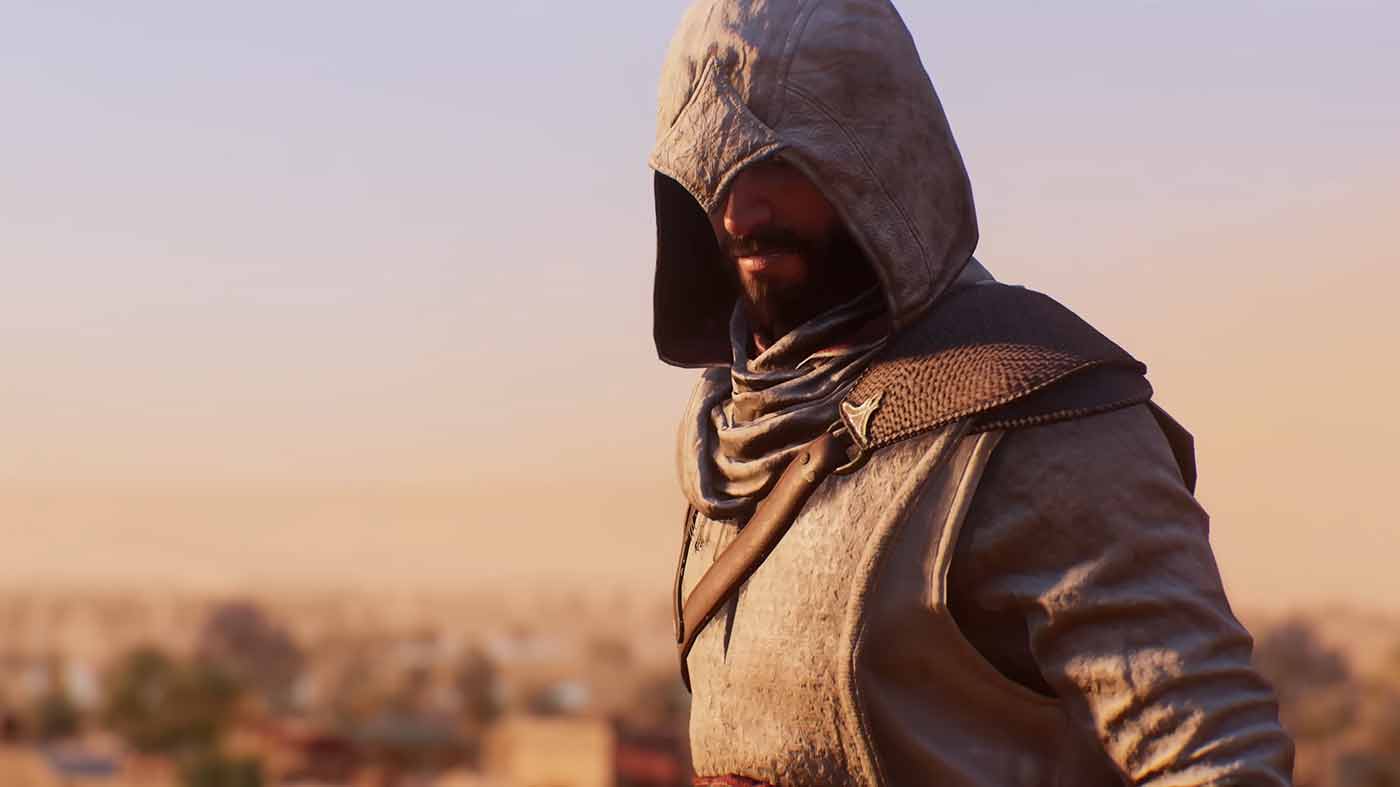
Fan reactions to Basim like you’ve just mentioned bring me to I think one of the biggest things heading into Mirage which is the idea that this game has been designed to directly tackle expectations and desires expressed in the Assassin’s Creed community. But does that kind of pressure get to you at all?
Yes, of course. We listen to the community very much, and I’m just going to be very honest about that – sometimes the community can push you in a very positive direction because they’re supportive and sometimes it can be a little bit overwhelming. And that’s fair; people are waiting for specific stuff and not everybody thinks the same way. So, we have a part of the community that is more used to the open worlds, like Valhalla and Origins, and the ones that are actually coming from the earlier games, and that’s the community we speak to the most because they want this kind of game. And we have to also take a bit of what existed in the more recent games, which is actually the open world structure.
So, in terms of narrative, we took both of these – we took the linear story from the other games, so the beginning (of Mirage) is very linear and then you have the ending that is linear too, with a point of no return. And the open world section has been structured in a way that every tool that you get from Musa and the inventors, every rank that you get from the Hidden Ones, it’s totally related to the story. So even in this open world structure, you still have this feeling of evolution and of a character growing up, and that was very important.
So, I think we took both worlds, the most recent and the earliest ones, but it can be a lot of pressure and sometimes it can be a bit, yeah, overwhelming is a good way to put it. Because it’s so heartwarming when you see people being passionate about what you’re doing and being supportive and saying, okay, we’re behind you guys. That helps a lot, because doing a video game is not easy. And we like to say that when you can launch a game, it’s a miracle every time because it’s such a messy, messy thing.
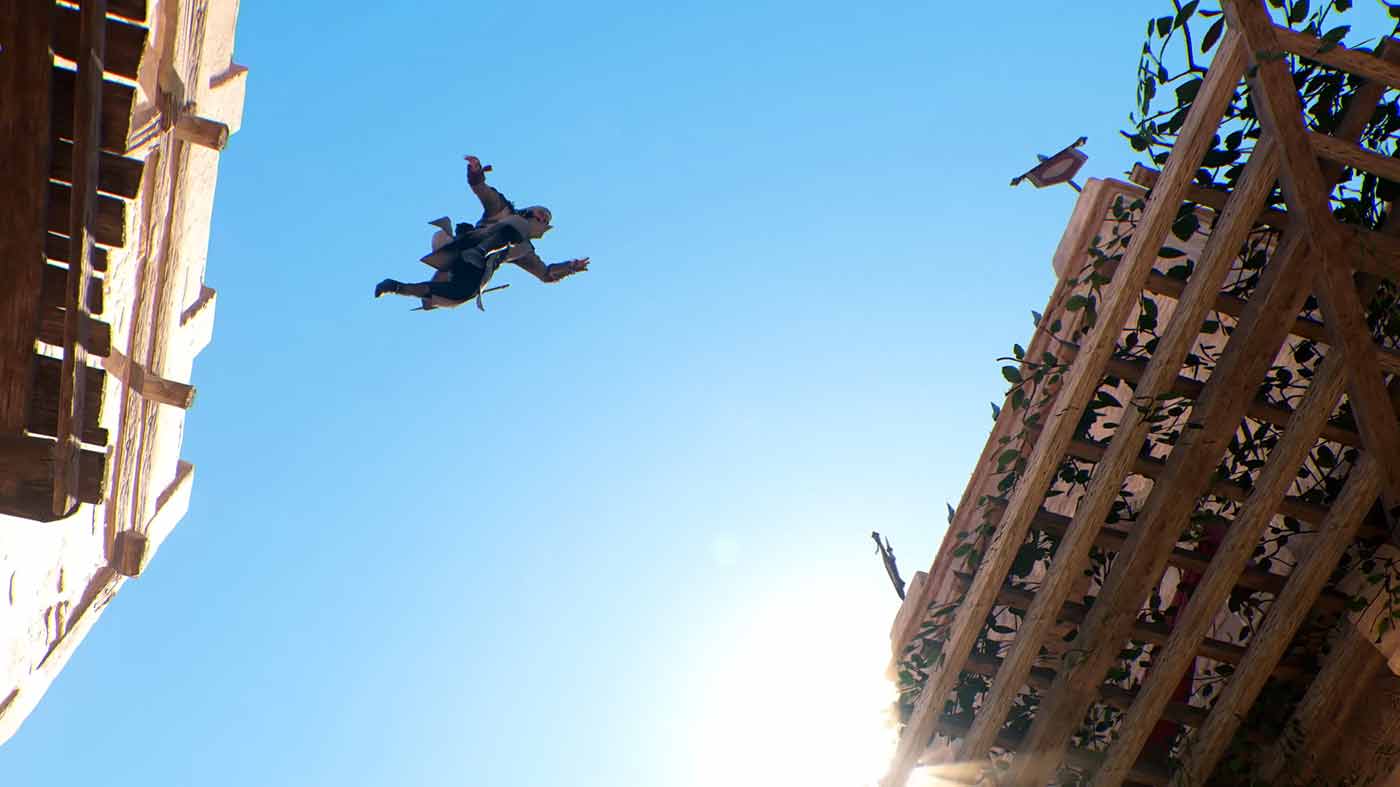
And overwhelming isn’t always a bad thing, right? It can be an interesting motivator.
Absolutely. But yeah, it’s hard. It’s good to have some nice feedback and people just being supportive even though, you know, everybody is not going to be pleased with everything. That’s the way things are. But we had a very supportive community.
I want to talk a little bit about Rashan, Basim’s mentor character. It’s so refreshing to see an older woman placed in such a pivotal position in the narrative, I feel like matriarchal types are really underutilised in the gaming space. Can you talk a bit about how you wrote her and what she means to you?
When we talked about Roshan for the first time, Stéphane Boudon (Creative Director) and I, we had a conversation during probably the first two weeks of the project. And we talked about Basim and he said “he should have a mentor” I was like, yeah, he should have a mentor and I would like it to be a woman, but I would like it to be a woman in her 50s and he was totally on board. And it started just like that, and it never changed. Coming from the movie industry first, I know that a lot of my friends are actors and a lot of them, the women, they actually struggle to have roles, big roles, when they reach even 40, actually. So, it was something I wanted to do.
And soon enough, during the process of creating this character, she was supposed to be Turkic, and she had another name at that point because Roshan (the name) is Persian. Eventually our producer suggested Shohreh Aghdashloo, the actress who actually portrays Roshan, would be great in this particular role. So we asked her, she said yes!
In creating Roshan, the challenge was that I wanted to avoid having a mother-son relationship that we tend to see between a female mentor and a guy like Basim that is much younger. And that’s probably why Roshan has her secrets, she doesn’t talk very much and she doesn’t like Basim talking about his own struggles. So, most of the time she would just say, you know, we’re all about the Hidden Ones and it’s not about yourself, keep your mind on the job.
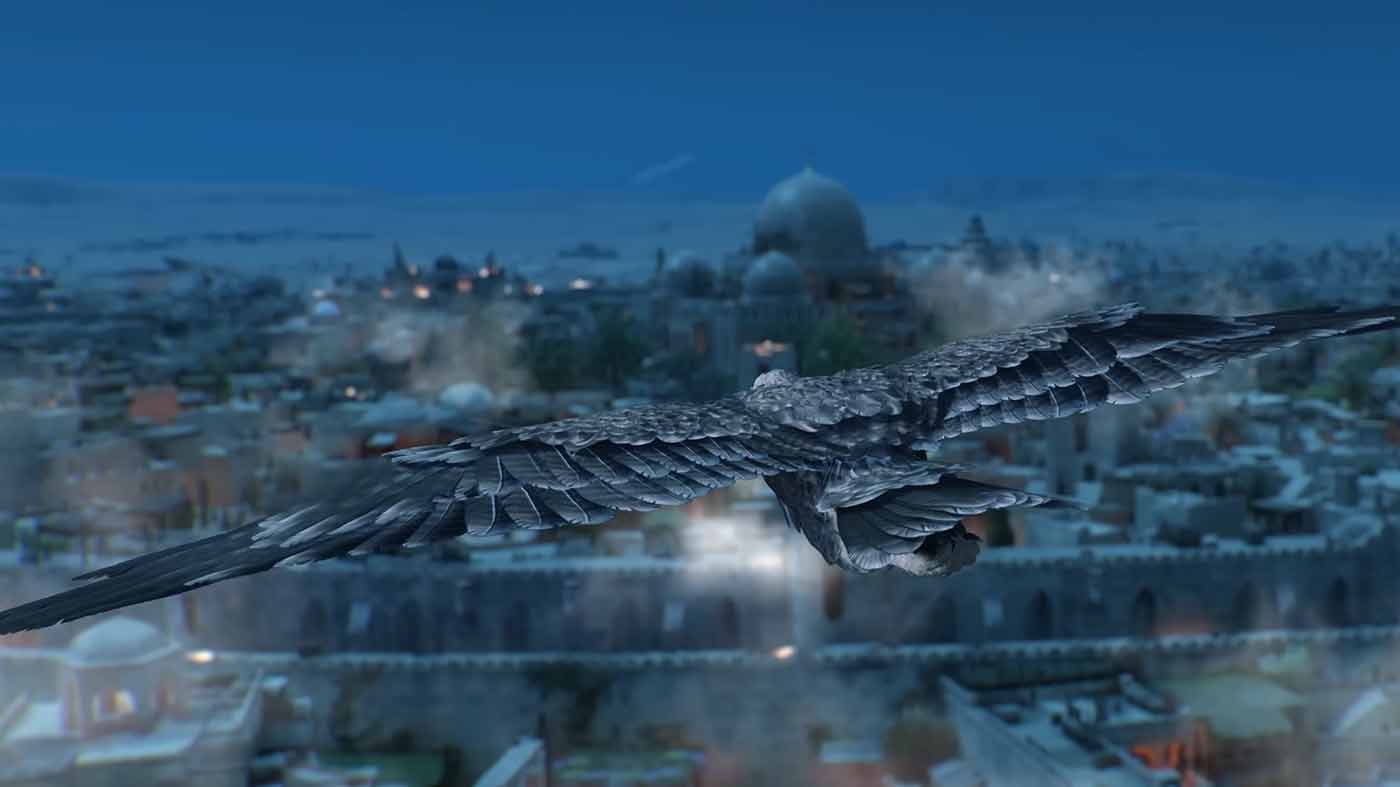
While we’re talking about the character writing in Mirage I’d love to hear about how designing the story for the game felt for you and the team given that you didn’t need to worry about, say, filling out a 50+ hour game? Did this allow for a more intimate narrative?
We talked about the structure at the beginning, but since we knew that we wanted to go back to the roots the linear stuff was pretty much the solution. The problem with open worlds, and I’m sure you’ve played plenty of them, is that it’s very difficult to gate the narrative. So that means having the feeling, for example, if you take Valhalla, you don’t have the feeling of Ivor evolving in that sense, even though you have some very specific plot points, she’s not going to change as a person because in gameplay, that would mean a lot of things. That would mean changing the dialogues, the way she answers to people. That would be very complicated. So, it was way easier and also it was a choice having the linear structure inside the open world. And the tricky thing is making sure that the player doesn’t feel like they’re constrained in the open world. Because we know that players playing Assassin’s Creed games recently, they like to be free to wander the city and do all the stuff.
But the other thing was on the narrative side, making sure that every side content, you would call it, but I don’t like the term side content, the Tales of Baghdad they were all built and written in a way that would support either Basim or the world. So, making sure that people feel what Baghdad was and encounter different characters, even for a few minutes. So that was easier, I think, for the writing part. What was more difficult is making sure that the player feels the evolution of Basim, that was the key point.
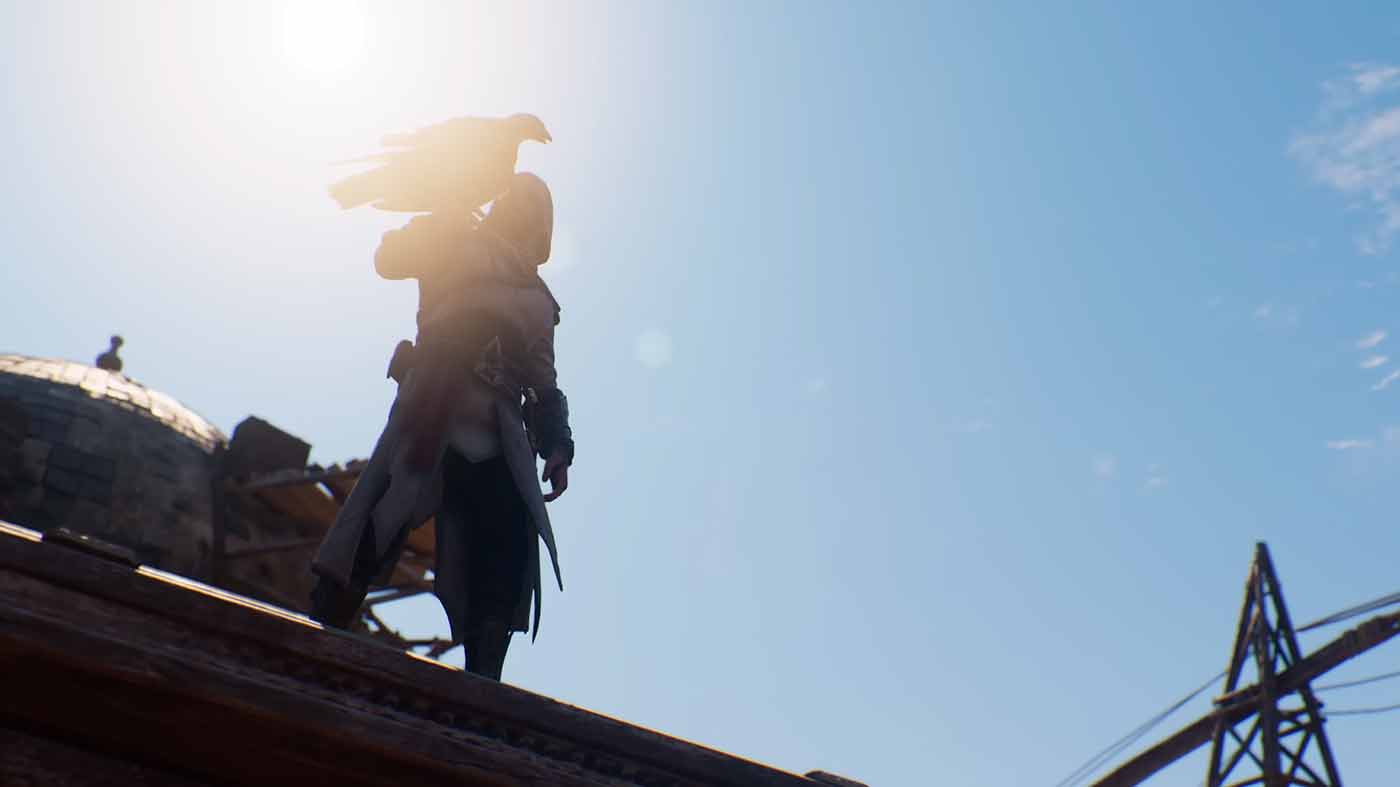
I want to pick your brain about something you just said. You don’t like calling it “side content” and I love where your head is at with that. How do you delineate narratives and where does the value for writing a video game narrative specifically come from for you?
Well, I always say the same thing – it’s all about making sure that mechanics and narrative work together. So, in this specific example of Mirage, it’s really about making sure that the feeling that player has of being more and more skilled and becoming an assassin themselves is linked to what the character is feeling. So, it’s more about working on this symbiosis between mechanics and narrative. So that’s what I like the most and that’s why I pushed the linear beginning and linear ending for Mirage because we needed that.
Narrative in video games, people tend to think, and even inside of the industry, that narrative is just a cherry on top, that you actually write stories maybe at the end of production and no, that’s not how that works. And also, if the story is just coming from nowhere, you have the feeling as a player that you’re just fed with meaningless cinematics most of the time because the gameplay doesn’t make sense and what we call Ludonarrative Dissonance. So that’s something that I really want to avoid, and I like the little details and side content, for example, can reinforce this feeling of mechanics and world being tied to the narrative. And world is narrative, too. It’s what I like about video games, is using these tools of interactivity.
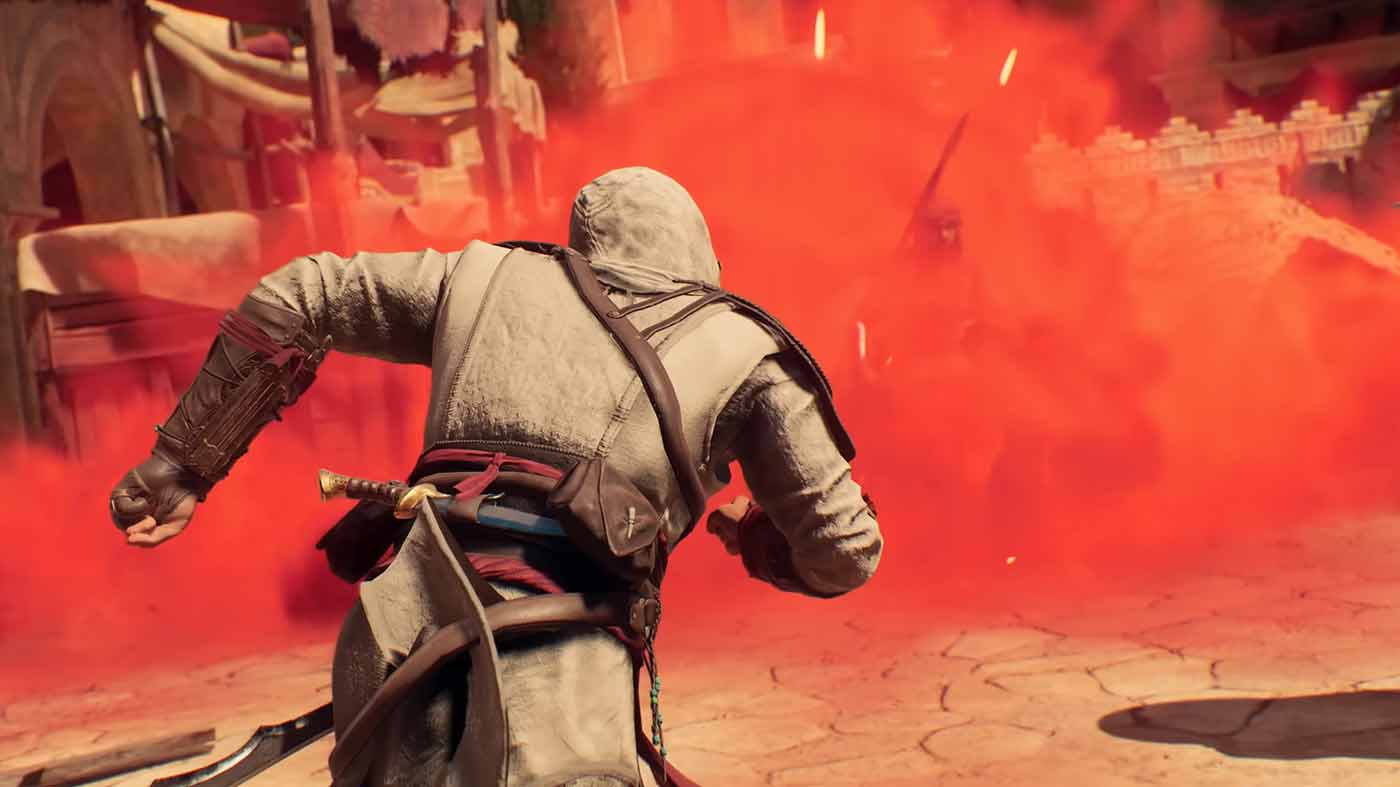
I know that Mirage has effectively been born from DLC originally planned for Valhalla, can you talk a bit about how the narrative team built it into its own story? I imagine that was a tough process?
Well, it was not at all, because actually, when I entered the conception phase… we were thinking about bringing Eivor to the Middle East, that was the DLC. And it’s something that could happen because Vikings actually went to the Middle East, and they were used as bodyguards for some caliphs. But the Middle East is very iconic in Assassin’s Creed and maybe we could do more and very soon, I think it was a couple of weeks, Stéphane actually pitched to the HQ and said, okay, we have the opportunity to do something going back to the Middle East, and we have Basim, that actually comes from Samara, and could we do something with that. So, he pitched the idea, and right away it started like that.
So, we didn’t have a process, because when we started working on that, it was so early, and we started with this idea of a standalone game instead of a DLC. Bordeaux, the studio, they worked on Wrath of the Druids before, and it’s cool doing DLCs, but it’s not really your content, per se. And in this case, it was like the opportunity also to lead a first project, and especially an Assassin’s Creed game, which is great.
It seems like the team has enjoyed this experience. Is it something you’d personally want to do again?
Why not? (laughs) Life will tell. But yeah, absolutely. I mean, the thing with Assassin’s Creed is that the lore is especially complicated and it’s very easy to make inconsistencies. So, that’s the tricky part, it’s a challenging one. And the community is also asking for different stuff and everything.
But the experience itself, and especially with Bordeaux, we have a very strong and great team, and we like working with each other very much. So that’s something that is important, too, especially in the video game industry.
Assassin’s Creed Mirage launches on October 5th, 2023 for PS5, PS4, Xbox Series X|S, Xbox One and PC. Amazon has physical pre-orders for $64 including shipping.
